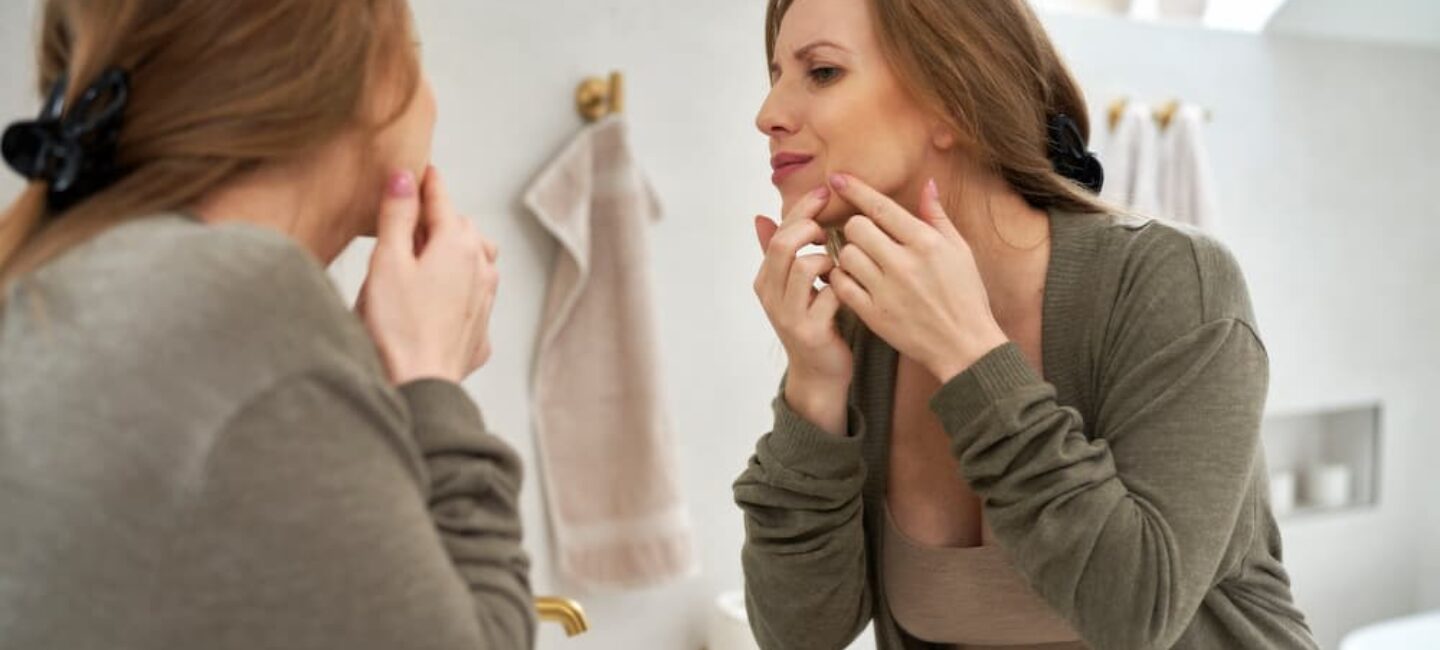
Taking a Bath After a Membrane Sweep: Precautions and Advice

Since you became pregnant, have pimples started appearing on your face, driving you crazy? Are these acne breakouts linked to pregnancy?
Here’s everything you need to know about this pregnancy symptom you may not have anticipated.
During pregnancy, you experience numerous hormonal changes. This hormone cocktail ensures your pregnancy progresses smoothly! But there’s a catch… These hormones are also responsible for some of the less pleasant pregnancy symptoms, such as nausea, tender breasts, mood swings, and yes—hormonal acne. In fact, the combination of pregnancy hormones and skin isn’t always a good match for some women (while others will enjoy glowing skin—every experience is truly unique).
Acne can start appearing from the very beginning of your pregnancy. It often shows up on the T-zone of your face, your chest, your shoulders, or even your back.
Of course, not all pregnant women will experience acne. However, it’s quite common and can vary in intensity—even from one pregnancy to another in the same woman!
Unfortunately, there’s not much you can do to completely prevent acne during pregnancy. To maintain healthy skin and limit the appearance of blemishes, it’s essential to adopt a good skincare routine.
If you need more tips and advice, don’t hesitate to consult a dermatologist.
Want to learn more? Feel free to download the May app, where you’ll find plenty of resources to support and guide you throughout your pregnancy.
🧑⚕️ Is treatment possible? Once again, hormonal acne is quite difficult to get rid of, especially during pregnancy, since hormone levels are high for nine months and the treatments you can safely use are limited to protect your baby.
But don’t lose hope! Your healthcare provider can recommend ways to optimize your lifestyle and, in some cases, prescribe a pregnancy-safe acne treatment.
❗We can’t stress this enough: before using any product—especially an acne treatment—always consult your doctor or midwife to avoid any risk to your baby.
☀️ The sun is not your skin’s friend: protect your skin from UV rays by using SPF 50+ sunscreen specifically designed for sensitive skin. Otherwise, you may be left with scars—and that’s not what you want!
While waiting for your acne to clear up, don’t pick or touch the pimples, even though we know it’s tempting. Scratching or squeezing them is not helpful and can worsen scars. So, hands off if you can!
During pregnancy, it’s important to pay extra attention to the products you use on your body. Like medications, some skincare products are not pregnancy-safe:
📜 Choose products with short ingredient lists and avoid problematic ingredients.
👀 Stay critical of marketing claims and beware of “greenwashing” (misleading packaging with green colors and flowers).
1️⃣ Use cosmetics sparingly. You don’t need 10 products morning and night every day.
🌿 Opt for natural solutions (vegetable oils, clay, etc.) whenever possible.
🧼 Establish a morning and evening skincare routine with pregnancy-safe products (and suitable for your skin type—double challenge!).
💄 Apply safe and suitable makeup, avoiding harmful ingredients.
🫧 Remove your makeup thoroughly using a good makeup remover.
🚰 Drink plenty of water to keep your skin hydrated. Pregnant women should drink between 1.5 and 2 liters of water daily.
🍽️ Eat a balanced diet. Poor nutrition can negatively affect your skin.
Before buying any product, it’s important to read the labels carefully to understand the ingredients. Once again, use cosmetics sparingly and choose natural options whenever possible. If in doubt, consult your doctor or midwife.
After giving birth and once your hormones begin to stabilize, your skin may change again. Acne may persist for a while or disappear altogether. Once again, every woman is different—there are no rules.
Acne may be annoying for you, but it does not affect your baby.
These pimples are only on your skin and have nothing to do with your uterus or the amniotic sac where your baby rests. So there’s absolutely no need to worry 😉.
Breakouts can have a real negative emotional impact on pregnant women. In addition to seeing your belly and body change, having to deal with acne can affect your self-esteem. As if you didn’t already have enough changes to adjust to over these nine months!
If acne makes you feel self-conscious, know that it’s completely understandable. You can try to remind yourself that these pimples are the result of the hormones helping to create your baby. They’re simply a sign that your body is working hard to ensure your baby’s health ❤️.
❗As we’ve said, acne can affect your daily life. If it becomes too much, talk to your healthcare provider or consider speaking with a therapist. This support can be invaluable. There’s nothing more important than taking care of yourself.
As we know, acne can leave scars, especially if you’ve been touching your pimples. This is also true for pregnancy acne. So how can you get rid of them? There are several treatments: laser, chemical peels, or hyaluronic acid injections. The first step is to consult a dermatologist to find a treatment that’s right for you.
In conclusion, acne during pregnancy is common, but it can be emotionally challenging. There’s no shame in it—don’t hesitate to talk about it if you’re struggling 😊.
–
Photo: Envato
This text was translated from French by an artificial intelligence. The information, advice, and sources it contains comply with French standards and may therefore not apply to your situation. Make sure to complement this reading by visiting the May US/UK app and consulting the healthcare professionals who are supporting you.
These resources might interest you

Taking a Bath After a Membrane Sweep: Precautions and Advice


Coloring your hair while pregnant: what precautions should you take?